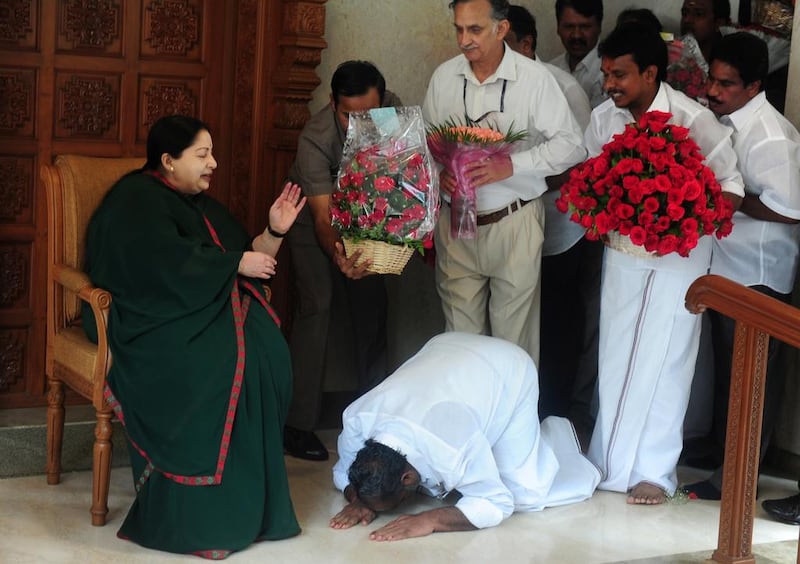New Delhi // The use of the phrases "yes, sir" and "yes, madam" is as instinctive as drawing breath in India, where a culture of servility is endemic.
For Hardik Dave, it is a culture that works against professionalism and harms both the giver and receiver of obsequious honorifics.
“It’s archaic and obsolete to call superiors ‘sir’ or ‘madam’ and it’s time Indians created a healthier work environment based on mutual respect rather than deference,” says Mr Dave, a 37-year-old IT consultant who has been based in Toronto since 2005 but visits his hometown of Ahmedabad frequently.
Two years ago, he launched a campaign called “No Sir, No Madam” to end the use of these titles.
Now, together with a team of volunteers, he is intensifying the campaign through videos and social media to persuade Indians to abandon the feudalistic habit of addressing anyone of higher rank, especially in the government, as “sir” or “madam”.
The use of sir and madam is usually accompanied by exaggerated bows, cringing gestures and looking downward to avoid eye contact.
The worst manifestations of servility are found in the civil service and politics, where subordinates scurry to open doors and carry briefcases while trying to anticipate every possible need.
“Whenever I travel for work by train, I hear men talking to their bosses on the phone and they use ‘sir’ twice or three times in a sentence. It’s like a tic,” says Nitesh Gupta, a contractor in New Delhi.
Some over-eager subordinates even go so far as to say “sirji” or “madamji” – combining sir or madam with the traditional Hindi honorific “ji” that is usually affixed to names as a sign of respect, as in “Rameshji”.
Mr Dave, during his frequent visits to India, found to his dismay that servility was also widespread in the private sector, with senior executives also expecting much “sirring” and “madaming”.
“The idea of addressing someone as your equal by his or her name is still seen as shocking, as insolent,” he says.
When he commented on it, his family told him to accept it as part of Indian culture but he decided to do something about it.
Together with volunteers who were as disgusted as he was, Mr Dave has made videos in English, Hindi and regional languages such as Marathi and Gujarati to explain to why there is no need for subservience in a democracy.
“It’s about communication and relationships,” he says. “Instantly, if you call a senior person in the office by their name, it allows you to be frank, to share, to express yourself more honestly than the flattery required by ‘sir’. That leads to better outcomes and better teamwork – all without spending a penny.”
Enforced servility “makes you less effective” as it harms your self-esteem, he says.
His animated videos explain that showing respect is important, but must not be combined with fawning.
It is an argument that will not get any traction in government or political circles, where the ego of civil servants and ministers is hurt when those speaking to them fail to be fawning.
The former chief minister of Tamil Nadu, J Jayalalithaa used to expect members of her party to prostrate themselves at her feet. When Indians need something done by a civil servant, they know they have to speak to the person behind the desk as a supplicant, not as an equal, if they want their work done.
Mr Dave has been encouraged by the fact that one of the No Sir, No Madam videos received 2.5 million views when it was shared on WhatsApp. He also takes heart from two recent signs that change may be afoot.
One was prime minister Narendra Modi calling Barack Obama by his first name during the former US president’s visit to India in 2015, which raised eyebrows at the time.
“That should show Indians that using the first name helps to create a connection, it moves things along,” Mr Dave says.
The other was last month, when Mr Modi stripped politicians and government officials of the flashing red beacon they put on top of their cars to show the world that they are VIPs.
“These symbols are out of touch with the new India,” Mr Modi said.
However, Prakash Teli, an assistant commissioner of tax in Ahmedabad and one of Mr Dave’s few supporters in the civil service, says it will take 20 to 30 years for current attitudes to change.
“It’s very deep-rooted in our mentality. The more you flatter someone, the more respect they feel they are getting,” he says.
“We don’t adhere to the line that divides respect from servility.”
foreign.desk@thenational.ae





